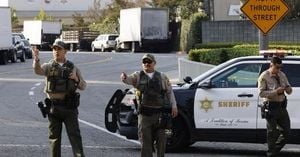Controversy erupted following the airing of the ZDF show "Schlagabtausch," where accusations surfaced about the audience selection process allegedly favoring leftist and green viewpoints.
During this politically charged broadcast, representatives from smaller parties, including FDP leader Christian Lindner, BSW Chief Sahra Wagenknecht, CSU leader Alexander Dobrindt, and others, engaged in discussions around the upcoming 2025 Bundestag elections. The format allowed these politicians to present their arguments, yet the audience reaction sparked debates about bias and representativeness.
The show’s reception became even more contentious when reports indicated the audience had been predominantly composed of students from the left-leaning Humboldt University (HU) and Free University (FU) of Berlin, leading critics to suggest intentional distortion of public sentiment. ZDF employee Dominik Rzepka, during analysis on the "heute journal up:date," did not shy away from admitting the selection of the audience was problematic. He stated, "The audience largely consisted of students from the HU Berlin and FU Berlin, which are fundamentally leftist institutions; this assembly was, so to speak, not genuinely representative."
This non-representativeness was brought to light particularly during moments of applause and enthusiasm directed primarily at the speakers from the Left Party and the Green Party. For example, when Jan van Aken, the Left Party leader, admonished AfD co-chair Tino Chrupalla, the crowd erupted with cheers, highlighting the perceived favoritism.
Post-broadcast criticisms escalated, with CDU member Jan-Marco Luczak taking to social media to express his outrage, claiming, "So macht ihr die AfD erst richtig groß," insisting on necessary neutrality from public broadcasters. Meanwhile, FDP's Wolfgang Kubicki called for accountability from ZDF, linking the biased audience to broader issues of election fairness. He demanded clarification from the ZDF management, emphasizing, "It cannot be the case... the public broadcaster engages so indecently during such sensitive phases of the election environment."
The backlash was so intense on social media and among political observers, with many deeming the event indicative of bias, sparking hyperbolic comments like "Tiefpunkt des Wahlkampfs" (the low point of the campaign) and labeling the broadcast as a "linke Shitshow" (leftist shitshow).
The ZDF responded to the uproar, stating, “Interested citizens could apply for tickets; there were 127 guests. We typically see balanced attendance for these kinds of programs. We do not inquire about attendees’ political views.” This statement was soon contradicted by Rzepka's earlier observations and fueled suspicions about the authenticity of the audience demographic.
Further complicity emerged when ZDF, via its spokesperson, attempted to clarify its outreach process for audience selection. Despite the initial impression of casting bias, the ZDF claimed they had contacted various Berlin institutions, including the Kennedy Institute for North American Studies, the Hertie School of Governance, and others, emphasizing typical practice rather than any targeted political bias.
Interestingly, ZDF later retracted earlier assertions about outreach to the Friedrich Naumann Foundation, which raised eyebrows and posed questions about internal processes and oversight when it came to audience enlistment.
Dominik Rzepka's revelations about the audience's political composition underscored issues surrounding representation. He suggested this unevenness could also be linked to the time of the broadcast, with many politically aligned viewers perhaps not being available or disinterested, hence skewing participant demographics.
The core question remaining from this TV scandal is whether such audience selection is too prone to misrepresentation and misinterpretation, creating skewed perceptions around major political events. It raises the pressing need for public broadcasters to critically assess how they engage audience members, highlighting the importance of transparency and balance especially during key electoral discussions. Overall, what becomes apparent is the heedless challenge politicians face—addressing audiences where their lines of support may not necessarily reflect broader public sentiment, creating real stakes amid rising scrutiny and skepticism from constituents.



